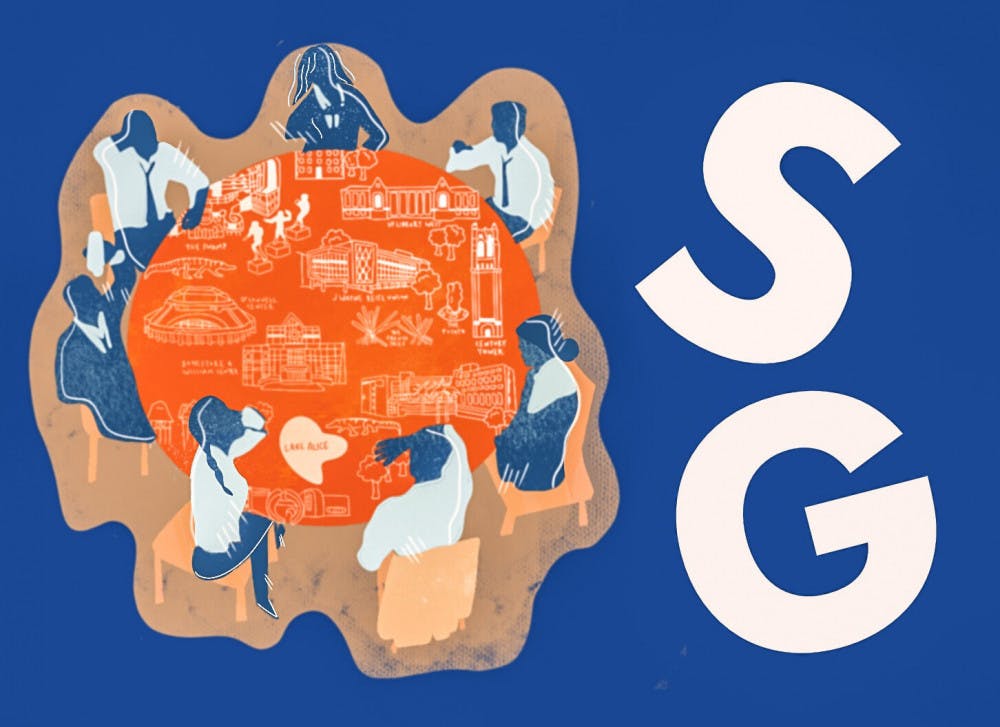Gator Party has kept a grip on senate committees for the past three semesters. This semester is no different, with 100% of nominated committee members belonging to the majority party.
Gator Party has held a majority in Senate for more than a year since Spring 2020 when it won its first executive ticket. Now, with about 70 Gator senators in the chamber, the composition of Senate committees echoes this majority.
Committees are responsible for reviewing bills, recommending replacement senators, amending the budget and enforcing senator requirements among many other responsibilities.
Currently, Gator holds 97.5% of representation in committees. The remaining 2.5% amounts to one senator: Minority Party Leader Gabrielle Adekunle, who is guaranteed a spot on the Replacement and Agenda Committee according to SG codes.
This distribution is disproportionate with Senate’s composition, in which Gator accounts for about 70% of Senate seats, and Change 12%. Fifteen percent of seats are empty and it is unclear what party the remaining 3% of senators belong to.
Despite holding 12 Senate seats, Change does not have any appointed representation in the committees.
Data compiled by The Alligator shows since at least Fall 2020, about 80% of nominated committee members have been affiliated with Gator, translating to at least 43 out of 54 counted nominees. It is unclear what parties the remaining 11 belong to.
The data was collected through past Replacement and Agenda recommendations on senate meeting agendas. A majority of committee seats are filled in the meeting following ratification of that semester’s election results.
Senate recently approved three members for Budget and Appropriations, four for Information and Communications, six for Rules and Ethics, and four for Judiciary. Senate also approved four chairs to rule over these committees, all of whom are affiliated with Gator Party.
Four out of six members on the Replacement and Agenda Committee are also elected: the Senate President, Pro-Tempore and two Members-at-Large. This semester, all four members are Gator Party.
A UF Supreme Court case in February 2021 established suspicion on Gator Party’s trend of favoring their own senators for committee seats. Although the current data does not account for all committee members appointed for the last three semesters, it continues the pattern.
While the number of Gator committee members is disproportionate, just three out of 12 Change senators applied for a seat.
Ethan Sawyer (Change, District D), a freshly elected senator, applied for a seat on the Budget and Appropriations and Information and Communications committees but didn’t get either one. He believes this is because he didn’t know the answers to questions about the specific functions of the committees he applied to.
“I also felt like, going in there, I shouldn't have been expected to know the details of those committees, considering I had just started like a week prior,” he said.
Sawyer, a 19-year-old political science sophomore, said he understands why Gator senators got all the seats. It makes sense for a political party to pick candidates whose goals line up with what it wants to accomplish.
“If [Change] were in that same position, being the ones on the other end of the table ... we would probably pick people that we felt like aligned with our moral compasses the same way or our party beliefs the same way,” he said.
While it may make sense to some, Communist Party president Alfredo Ortiz considers this trend as discrimination. He has witnessed the same trend in replacement senate seats, and filed a case with the UF Supreme Court focusing on dampening party favoritism.
According to data collected by members of the Communist Party, 98% of replacement senate seats since Spring 2019 have been affiliated with the majority party at the time. The remaining 2%, totaling to one senator over two years ago, belonged to a minority party. Ortiz believes this proves discrimination.
“This is something that the majority party uses after elections to boost their percentage of the seats and to maintain control over legislation,” Ortiz said.
The Communist Party collected the names of nominated replacement senators through senate agendas. Ortiz said it found out senators’ party affiliations through senate minutes, election results and social media.
The Alligator was only able to confirm that 28 out of the 69 nominated replacement senators listed, about 41%, were affiliated with the majority party at the time since 2019. Public records requested for party affiliation forms were not available in time for publication.
Ortiz wants the court to alter the composition of Senate committees by making it so they are proportional to the number of seats each party has. He’s confident that the Supreme Court will side with him on this case.
The court decided to hear his case as of Sunday.
Contact Allessandra at ainzinna@alligator.org. Follow her on Twitter @ainzinna.

Allessandra is a third-year journalism major with a minor in English. In the past, she has covered local musicians and the cannabis industry. She is now the Student Government reporter for The Alligator. Allessandra paints and plays guitar in her free time.






